
Do I Need My Wisdom Teeth Removed? Signs to Watch For
Wisdom teeth, also known as third molars, typically emerge between the ages of 17 and 25. While some people experience no issues when their wisdom teeth come in, others face complications that can negatively impact their oral health. In many cases, wisdom teeth removal becomes necessary to avoid problems such as pain, infection, or crowding. Understanding the signs that indicate a need for oral surgery can help you take timely action.
If you are unsure whether you need wisdom teeth removal, here are some key symptoms and situations to keep in mind.
Persistent Pain in the Back of the Mouth
One of the most common indicators that it may be time for wisdom teeth removal is recurring pain at the back of the mouth. This pain may feel sharp or dull and can come and go or remain constant. It often results from wisdom teeth being impacted, which means they are unable to fully erupt through the gums due to a lack of space.
Impacted wisdom teeth can press against neighboring molars, causing discomfort and inflammation. In severe cases, the pressure may lead to tooth damage or shifting. If you notice pain in this area, especially while chewing or opening your mouth, it is time to see a dental professional.
Swollen or Bleeding Gums
Another warning sign is swollen, tender, or bleeding gums around the area where the wisdom teeth are located. This condition often signals inflammation or infection due to partially erupted teeth trapping food and bacteria. A common issue is pericoronitis, which is an infection that occurs around a partially emerged wisdom tooth.
If you experience gum sensitivity or bleeding during brushing and flossing, you may require wisdom teeth removal to eliminate the source of the infection and protect your surrounding teeth.
Jaw Stiffness or Difficulty Opening Your Mouth
Wisdom teeth can impact your jaw’s range of motion and cause stiffness, especially if they are pushing against bone or nearby teeth. You may find it difficult to open your mouth fully or chew comfortably. In more advanced cases, this can interfere with everyday activities such as eating or speaking.
When jaw function becomes limited, a consultation for oral surgery may be needed to assess whether wisdom teeth are the cause.
Headaches or Earaches
Though it might not be the first symptom you think of, headaches or earaches can sometimes be linked to impacted or infected wisdom teeth. These third molars are located near several nerves and sinus passages, which means any inflammation or pressure can radiate outward and cause referred pain in other parts of the head.
If you are experiencing these symptoms alongside any dental discomfort, speak to your dentist or orthodontist about whether your wisdom teeth might be contributing to the problem.
Crowding or Shifting Teeth
For patients who have completed orthodontic treatment, the eruption of wisdom teeth can cause concern. These late-blooming molars may push against your properly aligned teeth, leading to crowding or unwanted shifting. Even if you have never worn braces, your teeth can become misaligned due to the pressure caused by incoming wisdom teeth.
Many orthodontists recommend wisdom teeth removal before or after braces to preserve the results of treatment and protect your bite from future misalignment.
Frequent Infections or Cysts
Repeated infections near the back of the mouth or the development of cysts around your wisdom teeth are both signs that oral surgery should be considered. Cysts are fluid-filled sacs that can form around impacted teeth. Left untreated, they can damage the roots of nearby teeth, erode the jawbone, or even lead to tumors in rare cases.
These types of complications require professional evaluation. If your dentist observes recurring problems or abnormal growths, removing the wisdom teeth may be the best course of action.
What to Expect from Wisdom Teeth Removal
When wisdom teeth removal is recommended, your dental provider will begin with a comprehensive evaluation. X-rays will typically be used to assess the position of the teeth and surrounding structures. If removal is necessary, the procedure is usually completed by an oral surgeon under local or general anesthesia, depending on the complexity of your case.
Recovery times vary, but most patients are back to normal activities within a few days. You will receive instructions on how to manage swelling, avoid dry socket, and maintain oral hygiene during the healing process.
Find Out if Wisdom Teeth Removal Is Right for You
While not everyone needs their wisdom teeth removed, many people do benefit from early intervention. Persistent pain, swelling, jaw stiffness, crowding, or repeated infections are all strong indicators that it is time to speak with a dental professional. By identifying these symptoms early, you can avoid long-term complications and maintain your oral health.
If you are experiencing any of the signs discussed in this post, contact My Orthodontist in Lawrenceville to schedule a consultation. We will evaluate your symptoms and determine whether oral surgery is needed. When it comes to wisdom teeth removal, timely action is key to protecting your smile for years to come.
The content on this blog is not intended to be a substitute for professional medical advice, diagnosis, or treatment. Always seek the advice of qualified health providers with questions you may have regarding medical conditions.

